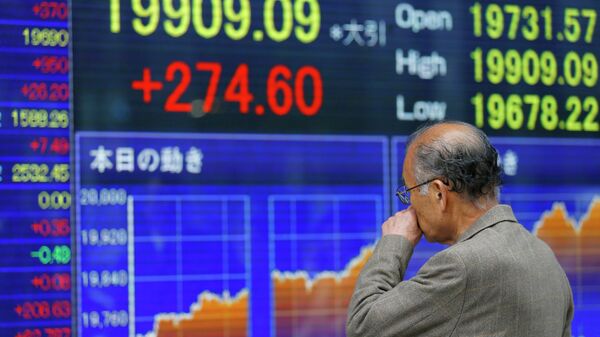Kristian Rouz – During Tuesday’s trading, Asian shares followed their upward trend set in the US with Wall Street posting record highs the previous day. As the yen slid in a stronger US dollar environment, Japanese stocks went up on higher competitiveness expectations, while mainland China showcased the most solid in 4 months rally as a wave of IPOs swept across the Communist nation.
The heavily export-reliant TDK Corp, extracting 91% its revenues from overseas sales, added 2.4% its stock as the yen slid against its major peers following a rebound in US Treasuries. The Japanese currency settled at 119.96 per greenback, its weakest in 14 days, amidst the sentiment that America’s battered growth will pick up pace in Q2.
The industrial enterprise Chiyoda Corp also rose 3.2% after winning an African natural gas tender. Stanley Electric Co and the mobile online games maker Klab Inc posted gains after announcing share buybacks, following the trend set by Apple the day before.
Japanese companies are thus far enjoying better profits than last year due to a weaker yen (against a stronger dollar), cheaper energy and rising wages as a consequence. With shareholders’ returns increasing as the overall Japanese economy is improving, there’s more investment capital arriving in Japan.
The Japanese economy is expected to add 1.6% in Q1 year-on-year compared to a 1.5% expansion in Q4. The preliminary data will be released early on Wednesday, and if the economy misses expectations, the Bank of Japan will eventually find itself under a greater pressure for more stimulus, but nothing more than that. The outlook is positive for Japan now.
“It’s unlikely the GDP figures can change the market’s underlying tone,” Akihiro Tsunoda of Sompo Japan Nipponkoa Asset Management Co. said.
In mainland China, brokerages and energy firms drove gains in the nation’s stock indices. Many companies conducted their IPOs, and investors were buying into those underperforming within the indices. The broad across-the-sectors stock market rally was China’s biggest in four months on Tuesday.
Financials rose 4.5% on the average, while PetroChina added 2.9%, ending its losing streak that culminated in a 20% decline since its April’s highest. With IPOs planned by some 20 firms during the timespan between Tuesday and Thursday, the Shanghai Composite Index rose 3.1% today, gaining the most in Asia-Pacific. The estimated IPOs combined value is at $451.1 bln, a huge influx of investment capital compared to the humble size of China’s financial market.
The CSI 300 Index rose 3.4%. Investors cheered after the Chinese authorities outlined their planning of economic reforms for 2015, promising more openness in the nation’s capital market and reshuffles in the inefficient and plagued by corruption state-owned corporations.
Attempts to stave off the bubble in real estate have cost China hundreds of billions in investment spooked by chaotic use of non-market regulative mechanisms. Thus, the risky and non-transparent margin lending has become China’s most lucrative financial activity. While the government is attempting to perfect its grip over each and every sector of the economy, the vicious practices of mismanagement, inappropriate regulative action and corruption have turned China’s financial sector into a money-laundering machine, barely connected with the real economy.
Margin traders accumulated the highest on the record 1.28 trln renminbi ($206.24 bln) in shares bought with credit money by this past Monday, according to the official data. Mutual funds were managing some 6.2 trln renminbi ($998.97 bln) in late April. As shadow banking and a broader ‘grey economy’ in mainland China is rife, the situation remains highly unstable.
MSCI’s broadest measure of Asian shares sans Japan added 0.1%. Australia’s S&P/ASX 200 shed 0.8% with raw materials on the decline, Korea’s Kospi rose 0.3% amidst cheering over a stronger dollar boosting Asian exports to America and elsewhere. The Kiwi benchmark NZX 50 shed 0.3%, while Honh Kong’s Hang Seng rose 0.4%.





